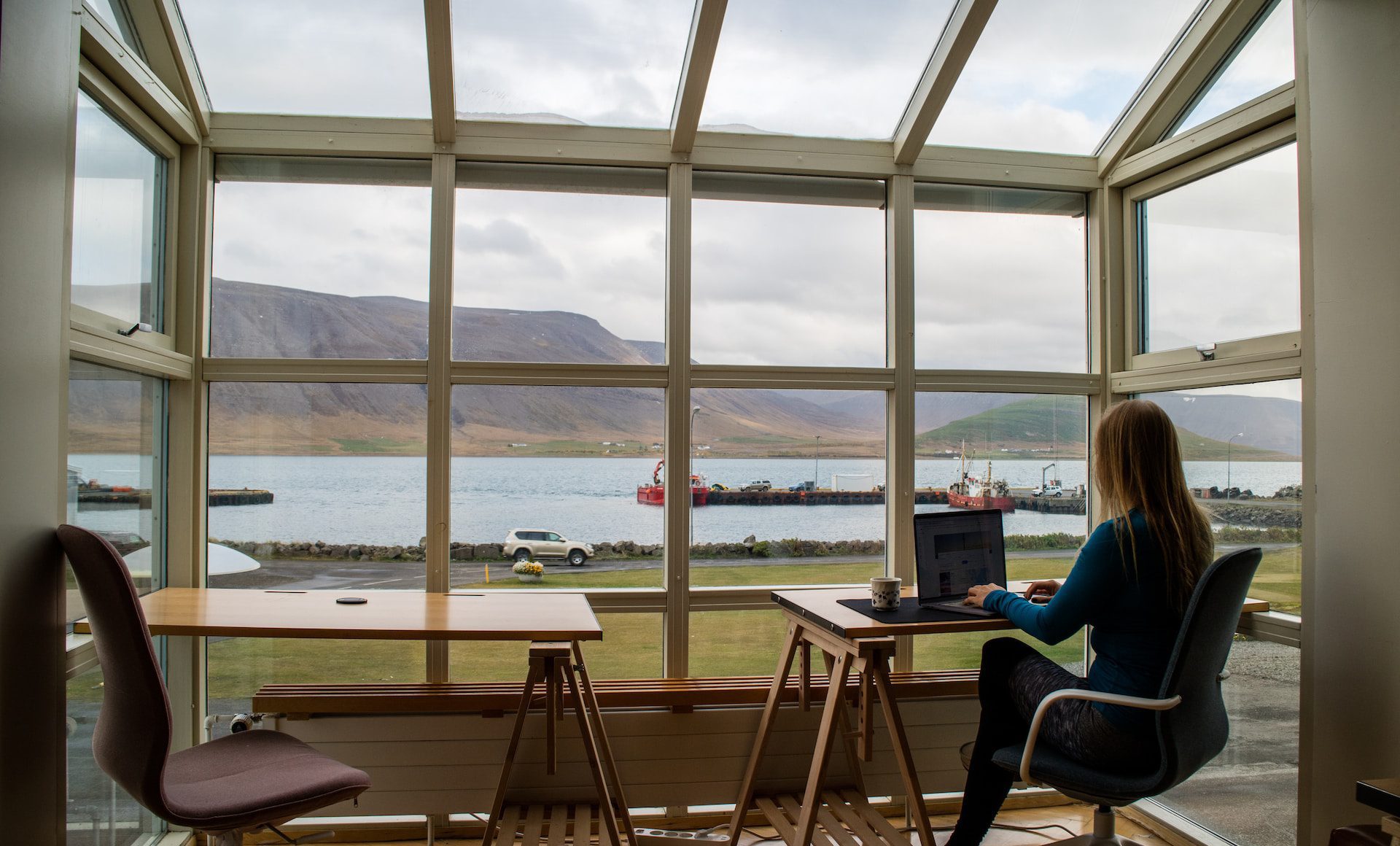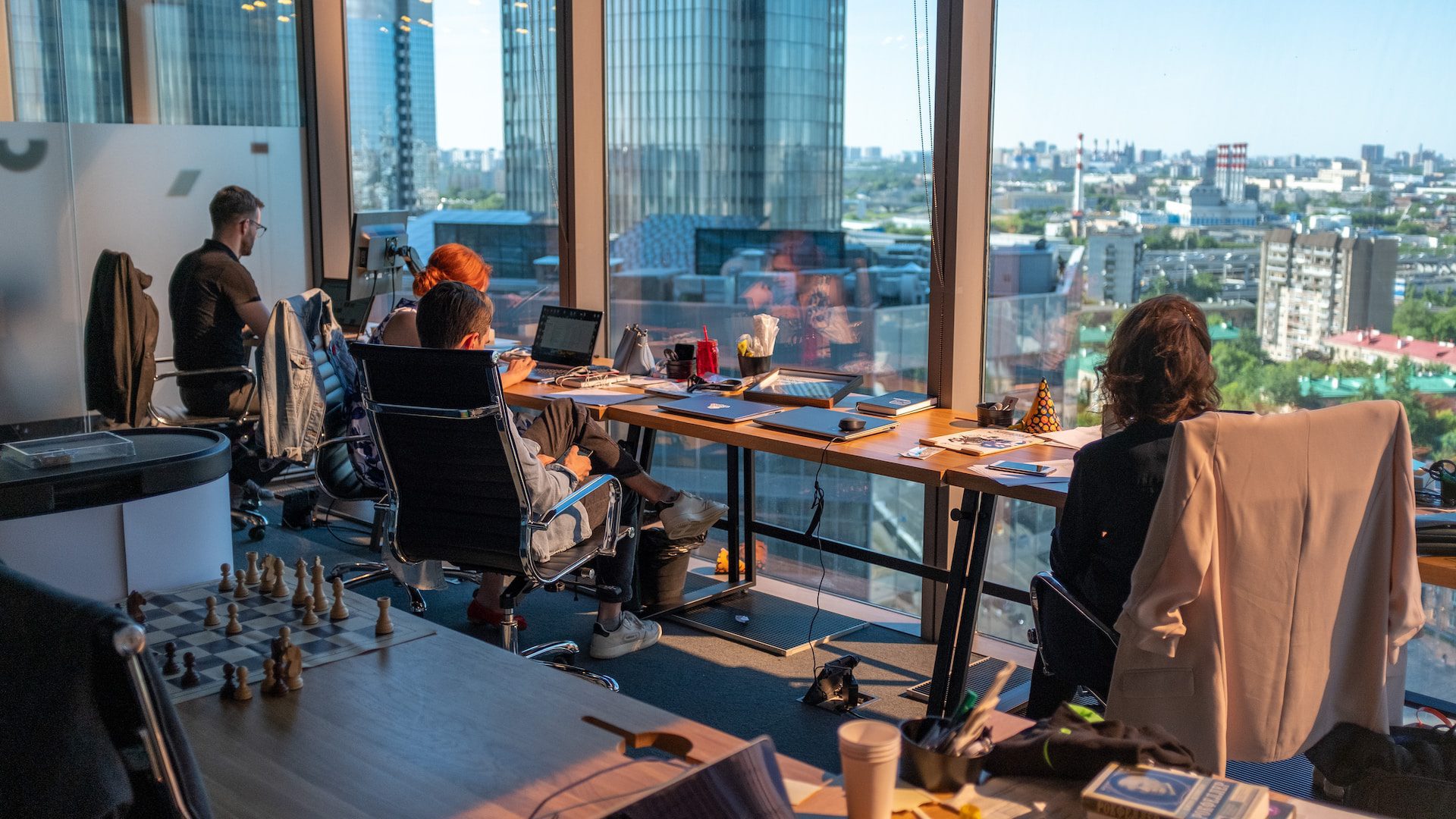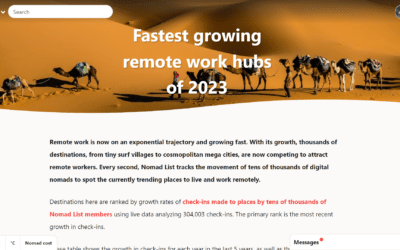|
|
Remote working, or at least hybrid working, is now the norm in various industries. Consequently, many companies are taking a remote-first approach to building their teams so that their employees can work from everywhere. But if you can work from everywhere, doesn’t that mean that you can work from anywhere?
In theory yes! If all you need is your knowledge and experience, a laptop, and a decent internet connection to get the job done, why can’t you work from anywhere? That could be your company’s dedicated office building, the home office in your primary residence, or a beach somewhere on the other side of the equator.
This is a philosophy that digital nomads have embraced for decades. It has led to a growing community of knowledge workers continuously traveling the world with a laptop. But as the opportunity for remote working grows, not everyone is ready to embrace the fully nomadic lifestyle.
Enter the workation. A workation is basically just choosing to work remotely from a vacation destination for a certain period. It is different from being a full-on digital nomad because it is for a fixed time.
While a workation might seem simple enough in theory, it can be more complicated in practice. Balancing the demands of work with the desire to explore and enjoy somewhere new or different is far from easy.
But that is why we have put together this complete guide to how to get the most out of your next workation.
Read on to learn more about what exactly a workation is, how it works, and the benefits and challenges of taking a workation. We’ll also share five essential tips to get the most out of your workation so that you can be productive, enjoy your environment, and return home feeling refreshed and recharged.

What is a Workation?
A workation is much as it sounds. It is when you decide to book yourself a vacation but continue to work while traveling. What this looks like in practice can vary greatly. Take the following scenarios as examples.
Scenario One
You want to go back to your hometown for two weeks for a friend’s wedding and to spend time with family, but you intend to continue working remotely from your old family home.
Scenario Two
You plan a trip to Paris, leaving on Monday night and returning on Sunday night. You decide to take Friday off to give yourself a long weekend but to work as normal on Tuesday, Wednesday, and Thursday.
Scenario Three
You decide to spend a month traveling around Brazil to enjoy the summer and carnival season. You decide to continue working, but you reduce your hours to 60% for that month so that you have more free time to enjoy all the festivities.
Scenario Four
You decide to spend the three coldest winter months working from an Airbnb on a tropical island. You are working remotely, full-time as usual, but waking up to go surfing and ending the day with beach sunsets. You spend your weekends on day trips to nearby jungle waterfalls and local villages.
These scenarios all look a little different, but they would all classify as a workation. Where you go, for how long, and how you manage your work commitments all depend on your individual situation and what you negotiate with your employer.
Negotiating with Your Employer
If you are considering a workation, in most cases you should tell your boss or HR team about your intentions before you book anything. If you aren’t booking days off, your employer is paying for your time. They do have some rights to know what you are doing, within reason.
If you spend a couple of days at your sister’s house the next state over while working, it is not likely to matter much. But even if your company has a “work-from-anywhere” policy, if someone discovers that you’re working from a yurt in Mongolia for three months and you didn’t tell anyone, there are likely to be repercussions.
If you actively choose not to tell your employer about your workation, and perhaps take steps to hide your activity from your boss or co-workers, this is known as a “hush trip”. You can read more about these here. People generally choose a hush trip when their employer does not support workations.
However, transparency is usually the best policy. There are also potential benefits to informing your employer about your workation.
-
Adjusting Your Work Schedule
First, if your company does have a work-from-anywhere policy, they may be able to help you adjust your commitments and lighten your workload so that you can make more of your workation.
This can include agreeing reduced hours, setting reasonable communication expectations, moving certain important meetings so that they are at a better time for everyone, and even delegating certain tasks to colleagues for a fixed period.
-
Legal Considerations
HR may also be able to help you with legal matters, including visas, travel insurance, and taxes.
For example, if you stay in another country for more than 183 days, you become a resident for tax purposes. This can impact the taxes that you pay, and contributions that your company makes towards things such as social security.
Your company may be able to help you avoid this issue or identify things such as double taxation agreements, so you don’t end up paying tax on your income twice.
-
Safety and Security
Your company is still responsible for things such as your health and safety and data security when you are working remotely. For your home office, this may mean providing funds for things such as an ergonomic chair or standing desk. On the road, they may be able to support you with noise-canceling headphones or a personal internet hotspot.
If you are taking company equipment with you, such as a laptop, your company may also need to update their insurance coverage for damage or theft.
They can also ensure that you have remote access to the company servers that you need to do your job. You would hate to arrive on the first day of your trip only to discover that IP addresses from the country that you are in are blocked by your company’s servers.
If you work for a company that does not support workations it is understandable why you might want to take a hush trip. But as companies are increasingly committing to work-from-anywhere policies, at least for limited periods of time, your employer may be able to help you balance your workload and make the most of your time while traveling.
Read about Airbnb’s work-from-anywhere policy that lets employees work in 170 different countries for up to 90 days each year.
Visa Considerations
If you are going overseas, you may need a visa to travel to your chosen destination. While many countries are now launching digital nomad visas that allow remote workers to live and work in their countries for one to two years, for most workations, you will probably just be traveling on a tourist visa as the stay is short.
While most people know that you can’t work locally in the country in which you are traveling on a tourist visa, you also shouldn’t technically work at all while traveling there, including for your company back home.
That said, immigration authorities don’t have an effective way to monitor whether you are working remotely while traveling in their country, and a lot of countries turn a blind eye to this kind of remote work as they know it means relatively wealthy travelers spending in the economy for a few months.
Therefore, you are safe to travel on a standard tourist visa on most workations. But it is best not to mention your intention to work remotely when discussing you plans with any border agents and just focus on your tourist activities.
Benefits and Challenges of Workations
According to a 2021 poll, 74% of remote workers in America would consider taking a workcation. What are the benefits that these remote workers are seeking in planning a workation, and what challenges are they likely to face in making it a reality?

Benefits of Workations
There are myriad benefits to workations both for employees and the companies that enable workations.
-
Save Days Off and Travel More
While the average holiday allowance in the UK is 28 days per year plus Bank Holidays, the average US citizen gets just 11 paid vacation days per year. Having so few days really limits travel opportunities. Continuing to work while traveling is a great way to spend more time traveling while spending less of your vacation allowance.
-
Boost Motivation and Creativity
It is no secret that the monotony of the modern workplace and the patterns and habits that we fall into as part of our regular work lives tend to reduce both motivation and creativity. Getting out of your routine and your comfort zone through travel can help boost your creativity and leave you feeling more fulfilled by the work that you are doing.
-
Take Advantage of Travel Deals
Travel can be expensive, especially if you are restricted on when you can go. Workations can give you a more flexible travel schedule, allowing you to take advantage of travel deals for more affordable flights, hotels, and more.
-
Better Well-Being and Reduced Burnout
It is true that a workation is not as good as a traditional vacation when it comes to recharging your batteries. That is because being able to completely turn off from work for a time also has its benefits. But a workation is a good halfway house. You should return from your workation feeling more balanced and grounded, and less likely to suffer from burnout.
-
Improved Workforce
From the perspective of companies, enabling workations provides several benefits in terms of workforce. Workation and work-from-anywhere policies can help companies attract and retain the best talent in competitive markets. Employees with access to this kind of flexibility also tend to be more satisfied in their roles and therefore loyal to their companies. Workations can also improve individual productivity and creativity, which also benefits the company overall.
Challenges of Workations
But just because workations are an overall positive does not mean that there aren’t challenges in making them work.
-
Balancing Work and Leisure
Successfully managing a workation requires a lot of discipline to balance time between work and leisure and to be fully present in both aspects of the experience. People often end up working when they should be playing, burning the candle at both ends, and letting the emotion of the experience disrupt their productivity. Managing a workation is a skill that needs to be learned.
-
Expensive
Even if you find a great deal, traveling can be expensive as you pay for flights, accommodation, eating out most of the time, and visiting the major attraction. If you spend a lot of your time working, it can feel like you are paying to do what you do at home, or worse, paying to work.
-
Perceptions of Slacking Off
Workations are still relatively new, and a lot of people that you talk to just see it as slacking off and taking advantage of the system. This can be a problem when trying to convince employers to let you take a workation, and it may be a problem with colleagues who perceive you as receiving unequal treatment. It can also be frustrating when you are talking with friends, and they don’t understand that you are working while on vacation.
-
Doesn’t Replace a Vacation
A workation is not a replacement for a regular vacation, because if you are working pretty much as normal or slightly reduced, you don’t have the opportunity to completely switch off from the cares and issues associated with the workplace. Fully switching off is essential to gain perspective and focus on other important things.
While the challenges of workations are very real, they don’t outweigh the benefits. They are more a reminder that if you are going to do it, you should do it right!
5 Essential Tips to Get the Most Out of Your Workation
While there are lots of things to consider when planning a workation, below are the five most important things to remember when planning a productive and enjoyable vacation while working.

1. Choose Where to Travel
Do you want to take a workation because there is a specific place you want to visit? Or are you taking advantage of the fact that you don’t need to be in the office to work from somewhere more relaxing and inspiring for a while? Whatever your motivation, it is a good idea to choose your travel destination carefully.
Scenario One
Imagine that you are finally taking your dream trip to Tibet, and you will be exploring the fascinating country for ten days. Is it reasonable to expect that you will be able to meet your work commitments while traveling?
Internet connectivity across Tibet is patchy, and even in hotels in the capital of Lhasa, you can expect speeds to be poor and access to be intermittent.
When you travel across the countryside to other important destinations such as Everest Base Camp and Lake Namsto, you spend hours on the bus without connectivity only to arrive at campsites where internet access is also highly limited.
When you are in bigger villages, you don’t want to spend your time sitting in your fairly basic hotel working when you could be exploring the streets.
Scenario Two
Now imagine that you are spending two weeks in Bali at an Airbnb close to the beach in Canggu.
You wake up early in the morning to go surfing before spending the hottest part of the day working in your air-conditioned accommodation or at one of the many local digital nomad hotspots, perhaps stopping for an early afternoon swim to recharge after lunch. In the evening, you enjoy the local nightlife.
On your days off, you take day trips to nearby areas such as culturally rich Ubud or the beautiful island of Nusa Penida to go snorkeling or diving.
Where you can reasonably expect to travel on your workation depends on you, what interests you, how you like to break up your day, and how disciplined you are both about blocking off time to work, and switching off from work so that you can be fully present to enjoy yourself.
That said, there are some questions to ask yourself to help you determine whether a location is a good choice for a workation.
- How good is the infrastructure where you are going?
This usually relates to internet connectivity but can relate to other things as well. You might also want to consider power and water outages.
- How close are you to the things you want to do?
Will you be staying close to the things you want to see and do or will transport eat up a lot of your precious time? City breaks tend to mean that everything is on your doorstep while exploring a larger region uses a lot more time.
- Will you have a quiet space to work?
This relates to the type of accommodation that you book, but also who you choose to travel with. Are you traveling with family members, and do they know how to respect your work time? Are you considering an organized trip or accommodation that will have you constantly around other people with a different agenda?
- How much time will you have?
Realistically, how much time will you have to dedicate to your work commitments? Are you at a beach resort or on a city break where you largely dictate your schedule? Or are you traveling somewhere with organized activities and most sights need to be visited during your prime work hours?
- How do you feel about where you are traveling?
Why have you chosen to travel to this location? Is it a place to relax, unwind, enjoy good food, and engage in activities that you love such as surfing or skiing? Or is it a place that you have always been fascinated by and you have a long list of things to see and do? Would you really prefer to be able to explore without the burden or work commitments?
- Have you been there before?
Many seasoned travelers suggest choosing somewhere that you have been before when booking a workation. This means that you are familiar with where to stay, how to get around, and what the best things to do are. This can help you settle in quickly, feel comfortable, and make the most of your time.
Only you can decide whether a destination is a reasonable location for a workation, but the best thing you can do is be honest with yourself and not try and force something that just doesn’t make sense.
2. Book A Longer Trip
This really goes hand in hand with where you choose to travel: how long do you intend to stay? The same kind of realistic analysis of the situation applies.
If you are staying with family for a few days, maybe to attend a wedding or another event, a short workation may make sense.
But if you are traveling to an exciting city like Paris, New York, or Shanghai, are you really going to be able to do everything you want in three to four days while also managing your work commitments?
For many destinations, you are better off booking a longer trip for your workation. This means that you have plenty of time to do everything without feeling quite so overwhelmed and rushed.
With two weeks or longer in a location you can establish yourself in your accommodation and create a schedule that allows you to really get to know where you are and have focused time for work that allows you to take advantage of the creativity that comes with being somewhere new and different.
Booking longer trips can also help you save money so that you don’t end up spending more than you earn while on workation.
- Long-term accommodation through services such as Airbnb can have big discounts if you book for a month or more. Services such as RemoteBase can help you find great deals on long-term rentals if you are flexible with where you travel.
- This kind of accommodation is usually larger, so you can have more space to establish a workstation. This means no paying for coworking spaces or several expensive coffees per day to work in a popular café.
- This kind of accommodation also usually has kitchen facilities, so you can save significant money by self-catering most of your meals.
- You will have more flexibility with your schedule, and you don’t need to pay a premium for bookings to squeeze everything into a few days. You can try and schedule activities for times when attractions are less crowded and sometimes more affordable.
If budget is a concern, there are lots of things that you can do to save money while traveling. Read some of the best money-saving hacks for digital nomads and travelers here.

3. Balance Your Workload
While you may be committed to working full-time while on your workation, ideally, you will want to minimize your workload so that you have as much free time as possible. This is particularly the case if your employer does not demand a specific number of hours each week, but only that you continue to meet your deliverables.
Before you head off, look at what you can do to limit your work commitments while traveling. If you have any major projects on your plate, try and finish them before you go, or at least complete all your deliverables so that others can continue with the project with minimal input from you. The idea is to minimize the number of hard deadlines that you have while you are on a more flexible working schedule.
You may also have tasks that you might want to consider delegating to other members of your team while you are traveling, if possible. For example, if you have tasks that require a lot of face time with clients or swift responses to queries from clients, this is the type of thing you might want to delegate.
For many people, the challenge is often not that there aren’t other people to pick up these tasks. Rather the problem is a habit and culture of holding onto tasks and doing as much as possible yourself to make sure “it’s done right”. Delegating and trusting others can be challenging but rewarding.
For things you can’t delegate, make it clear through communications sent prior to traveling and in your email footer or out-of-office reply that you are working different hours and therefore you may take longer to respond, but that you will be responding.
Conversely, while you are traveling, you may find that your creative juices are supercharged by the new environment and the time away from routine. Therefore, this may be a good time to schedule creative tasks that require deep individual work. You may find yourself returning to the office with work you are genuinely proud of.
4. Plan Your Time
While you always want flexibility with your travel time to engage with the unexpected, when you are on a workation, it is a good idea to plan you time fairly thoroughly.
First, your time to see the attractions where you are is more limited when you are on a workation than a normal vacation. So, research the things that you want to see and do and schedule the things that are most important and can’t be missed.
Alongside this, you need to figure out how you are going to manage your work hours. Any important work meetings or contact hours that you have should be scheduled, like your unmissable attractions.
Other work commitments should then be scheduled around when you are more productive, and when you can draw clear divides between your work time and your leisure time. For example, you might decide to schedule your main work time early in the morning when the rest of the town is still waking up and you can also enjoy a quiet coffee, and in the afternoons when, in many parts of the world, it is siesta time, and it is often too hot to be exploring.
You might choose to keep your weekends sacred as “work-free” times, or you might choose to work on Sundays so you can take advantage of the streets and sights being less busy on a certain weekday.
Having a routine, schedule, or plan that you stick to can help you manage your work-life balance while you are on vacation as the decisions have already been made about what you should be doing and where you should be. Having clear blocks of time can also help you switch more cleanly between work and pleasure mode so that you can be fully present in each when needed.
Another important part of scheduling your time is not overbooking yourself. It can be easy to adopt a work-hard-play-hard attitude and assume that you will be able to recover when it is all over. But if you burn the candle at both ends, you will quickly learn how missing sleep and self-care time can affect how you feel. This will impact your performance at work and your ability to enjoy your vacation time.
Recent research shows that it can take four days to recover from just one hour of lost sleep. The more sleep you miss, the longer it takes to recover per hour. That means that trying to do too much can be a recipe for returning more burned out than when you left.
Vacations are meant to give you an opportunity to recharge your batteries, and while a workation isn’t as effective as a traditional vacation because you can’t completely unplug from work, the change in environment and routine still does a lot to refresh you. Don’t throw all that away by sacrificing too much sleep.

5. Arrive Prepared
You will enjoy your workation more if you arrive prepared and confident that everything will go relatively smoothly, despite the potential for mishaps.
This starts with double-checking that your accommodation has all the amenities that you need. This principally means an internet connection. This is usually something prominently listed among accommodation amenities. But check reviews, because if the Wi-Fi isn’t up to scratch, it is often one of the first things that reviewers will mention.
But instead of leaving things to chance, also travel with a personal mobile hotspot to be sure that you can get connected when needed. Traveling with backup power banks is also a good idea as some regions of the world are prone to frequent power outages. Also, don’t forget an extension cable so that you can work where you want, rather than wherever there is a power plug.
If you are staying somewhere noisy or sharing accommodation with other people, you might also want to bring some noise-canceling headphones. This can help you concentrate when the people around you are innocently enjoying themselves without necessarily realizing that they are distracting you.
If you can, bring what you need to create a dedicated workspace within your accommodation. This helps you concentrate and is another way to help you draw clear lines between work and leisure time. Plus, if you are traveling with other people, it can help them understand when you are working and should not be disturbed.
However, while there are a lot of things to remember to bring when going on a workation, you don’t want to overdo it. Traveling for two weeks with five suitcases will likely leave you feeling more burdened than prepared.
Ready to Book Your Workation?
Now that you know the good, the bad, and the ugly of workations and how to make sure your next workation is a good one, will you be booking?
You can find many more resources on how to successfully travel while working on the resources pages of this website and on the blog.
And of course, you can also have a look at the workation we organize in the Swiss Alps (in spring and autumn).












